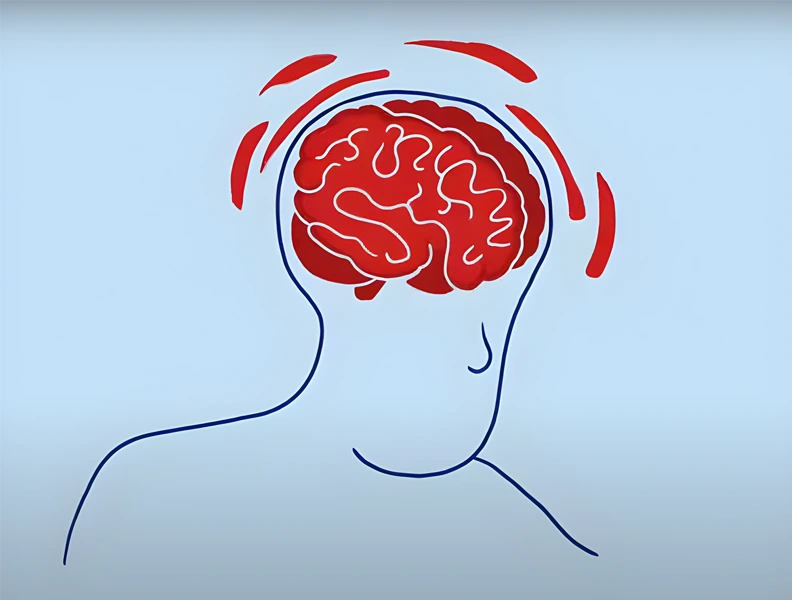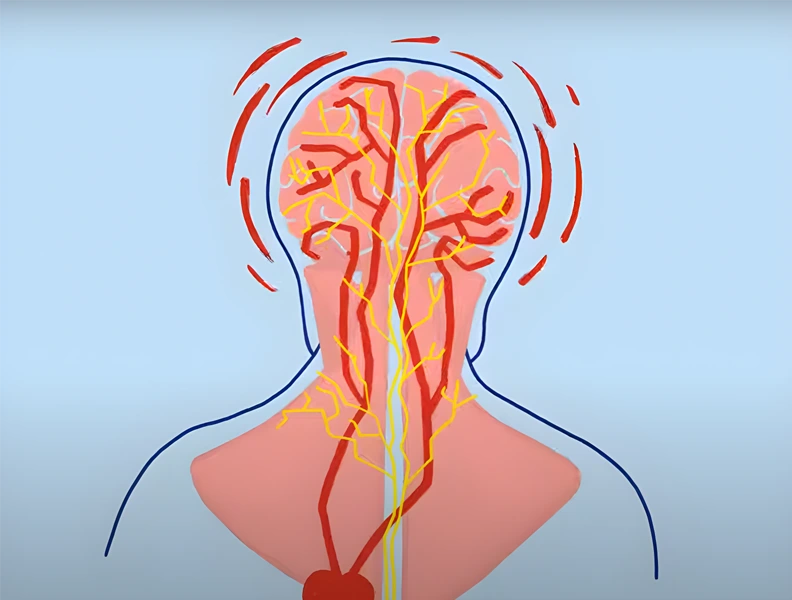What is a Concussion?
Concussion symptoms occur as a result of a mild traumatic brain injury (TBI), which happens when an impact on the head or a sudden jolt causes the brain to move rapidly inside the skull. This movement can result in chemical changes and physical damage to brain cells, leading to a range of symptoms that may affect physical, cognitive, emotional, and sleep-related functions.
While often described as “mild,” concussions can have significant effects if left untreated. Identifying and understanding the symptoms of concussion is crucial for timely diagnosis and treatment.
Concussions are commonly caused by falls, sports-related injuries, car accidents, or sudden jolts like whiplash. They can happen to anyone, but individuals involved in contact sports or high-risk activities, as well as children and older adults, are at higher risk.
Common Signs and Symptoms of a Concussion

Concussion symptoms can appear immediately after the injury or develop over several hours or days. These symptoms vary based on the severity of the injury and the individual’s overall health. Below, we group the most common signs of concussion to help you better understand what to look for.
Physical Symptoms of a Concussion
Physical symptoms are often the first signs of a concussion, arising from the immediate effects of the injury on the brain and surrounding tissues. These include:
- Headache or Pressure in the Head: The most common physical symptom, often described as persistent or throbbing. It may worsen with movement or activity.
- Nausea and Vomiting: Common shortly after the injury, particularly in severe cases.
- Dizziness and Loss of Balance: Resulting from disruptions in the brain’s coordination centers. This symptom may lead to difficulty walking or standing.
- Sensitivity to Light and Noise: Many individuals report heightened sensitivity, making it uncomfortable to be in bright or noisy environments.
- Blurred or Double Vision: Changes in visual processing may occur, often making reading or focusing on objects challenging.
- Fatigue or Drowsiness: The brain’s need to recover can lead to excessive tiredness, even after adequate rest.
Cognitive Symptoms of a Concussion
Cognitive symptoms reflect the brain’s difficulty in processing information and managing tasks.
- Confusion or Feeling Mentally “Foggy”: Difficulty understanding surroundings or feeling disconnected is a hallmark symptom.
- Memory Problems: Trouble recalling events before or after the injury, a phenomenon known as retrograde or anterograde amnesia.
- Slowed Thinking or Reaction Times: Responses to questions or stimuli may be noticeably delayed.
- Difficulty Concentrating: A common issue, especially during tasks requiring sustained mental effort, such as reading or problem-solving.
Emotional and Behavioral Symptoms
Concussions can also affect mood and behavior, often in subtle or delayed ways:
- Irritability and Mood Swings: Individuals may become frustrated or angry more easily than usual.
- Anxiety or Nervousness: Feelings of unease or restlessness can arise without a clear cause.
- Depression or Unexplained Sadness: Emotional changes may stem from both the injury and the frustration of dealing with symptoms.
- Social Withdrawal: Some people may avoid interactions, feeling overwhelmed or less engaged with others.
Sleep-Related Concussion Symptoms
Sleep disturbances are a frequent consequence of concussions, disrupting the body’s ability to recover. These may include:
- Difficulty Falling or Staying Asleep: Insomnia can exacerbate other symptoms by reducing restorative rest.
- Excessive Sleepiness or Fatigue: Some individuals feel an overwhelming need to sleep more than usual.
- Irregular Sleep Patterns: Shifting sleep schedules can affect daily routines and overall well-being.
Symptoms in Children and Babies
Recognizing concussion symptoms in children and infants requires careful observation, as they may not be able to articulate their experiences. Key signs include:
- Persistent Crying: Babies may be inconsolable after a head injury.
- Changes in Eating or Sleeping Habits: Reduced appetite or increased sleepiness may signal an issue.
- Irritability or Lack of Interest in Play: Behavioral shifts can indicate discomfort or confusion.
- Unsteady Movement: Difficulty walking or maintaining balance is a red flag.
Parents and caregivers should monitor for these signs and seek medical advice promptly.
How Long After Hitting Your Head Can Concussion Symptoms Start?
Concussion symptoms can start immediately or take hours to days to appear. Early signs like headaches or dizziness might seem minor at first but can worsen over time. Monitoring for symptoms after any head injury is crucial, especially within the first 48 hours.
What Does a Concussion Feel Like?
A concussion often feels like a throbbing headache, dizziness, or mental fog. Some experience blurred vision, fatigue, or ringing in the ears. Emotional changes, such as irritability or sadness, may also occur. Recognizing these symptoms of a concussion early is key to recovery.
What Are the 3 Main Symptoms of Mild Concussion?
The most common symptoms of a mild concussion are headache, dizziness, and confusion. These signs may worsen with exertion and typically improve with rest and proper care.
What Do Concussion Eyes Look Like?
Concussion eyes might include unequal pupils, delayed light response, or blurry vision. Dark circles or redness may also be visible due to disrupted sleep or stress. These changes should prompt medical evaluation if they persist.
What Are the Red Flags of a Concussion?
Red flags include worsening headaches, repeated vomiting, loss of consciousness, or slurred speech. Severe confusion, seizures, or difficulty staying awake are critical signs requiring immediate medical attention.
How to Recognize Concussion Symptoms

Concussion symptoms may develop in distinct stages, with some appearing immediately after the injury and others emerging hours or days later. Early symptoms, such as headache or dizziness, may progress to include cognitive and emotional issues if left untreated. Physical or mental exertion often exacerbates symptoms, making rest a critical component of recovery.
Subtle Signs to Watch For:
- Delayed Responses: Sluggishness in answering questions or reacting to surroundings may be overlooked initially.
- Behavioral Changes: Irritability or mood shifts that seem out of character can signal a concussion.
- Difficulty Resuming Daily Activities: Challenges in returning to work, school, or sports may indicate lingering effects.
Tracking Symptoms:
Keeping a symptom journal can help track changes over time. Note the onset, duration, and intensity of symptoms to provide accurate information to healthcare providers.
When to Seek Medical Attention
While many concussions resolve with proper care, some symptoms indicate the need for immediate medical attention. Seek urgent care if you experience:
- Severe or worsening headache.
- Repeated vomiting.
- Loss of consciousness, even for a brief moment.
- Slurred speech or difficulty walking.
- Increased confusion, drowsiness, or agitation.
For children, any significant changes in behavior, prolonged crying, or inability to wake up should prompt an emergency evaluation.
What Causes Concussions?
- Falls: Falls are the leading cause of concussions, particularly among young children and older adults. Slipping on ice, falling down stairs, or tripping on uneven surfaces can all lead to head injuries.
- Sports Injuries: Contact sports, such as football, hockey, soccer, and rugby, are common sources of concussions. Non-contact sports like cycling or gymnastics can also pose risks due to accidental falls or collisions.
- Car Accidents: Motor vehicle collisions often result in concussions due to the sudden force of impact. Whiplash, where the head jerks forward and back abruptly, is a common mechanism of injury.
- Physical Violence: Assaults, domestic violence, or being struck by an object can cause head trauma leading to a concussion.
- Explosive Blasts or Combat Injuries: Military personnel may sustain concussions from shock waves during explosions, even without a direct impact to the head.
- Recreational Activities or Accidents: Activities like horseback riding, skiing, or skateboarding carry a higher risk of falls and head injuries, especially without protective gear.
Risk Factors for Concussions
Certain factors increase the likelihood of sustaining a concussion or experiencing prolonged recovery:
- Age: Children and adolescents have developing brains that are more susceptible to injury, with symptoms that may last longer than in adults, while older adults, with slower reflexes and an increased risk of falls, are more prone to concussions.
- Participation in High-Risk Activities: Athletes in contact sports or those engaging in activities like rock climbing or cycling without helmets are at higher risk.
- History of Previous Concussions: Individuals with one or more past concussions are more vulnerable to future head injuries and may experience more severe symptoms.
- Improper Use of Safety Equipment: Failing to wear helmets or using poorly fitting protective gear increases the risk of head injuries during sports or recreational activities.
- Medical Conditions: Pre-existing conditions like migraines, ADHD, or mental health disorders can complicate concussion recovery and prolong symptoms.
- Gender Differences: Research suggests that women may experience more severe symptoms and longer recovery times compared to men, though the reasons for this are not fully understood.
Reducing the Risk of Concussions
While concussions cannot always be prevented, certain measures can reduce their likelihood:
- Wear appropriate protective gear, such as helmets, during sports or activities.
- Ensure home safety by installing grab bars, using non-slip mats, and securing rugs to prevent falls.
- Follow safety guidelines for sports, including proper tackling techniques and adherence to rules.
- Seek medical clearance before returning to activities after a concussion to prevent further injury.
Understanding what causes concussions and recognizing risk factors is essential for prevention and effective management. Taking proactive steps, such as using protective equipment and addressing environmental hazards, can help minimize the likelihood of injury.
If you or a loved one has experienced a head injury and is showing concussion symptoms, don’t wait to seek help. Early diagnosis and treatment are essential for a full recovery and to prevent long-term complications. At our clinic, we specialize in comprehensive concussion care, providing personalized assessments and tailored treatment plans to address your unique needs.
Take the first step toward recovery today—contact our team of experts to schedule an appointment and get the care you deserve. Let us help you get back to your best self!




